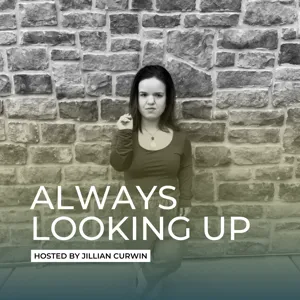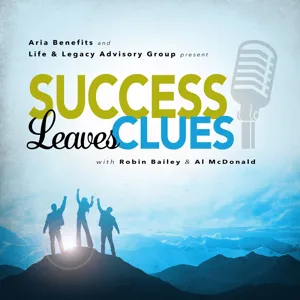Podcast Summary
Advocating for Inclusive and Safe Lab Spaces for Service Animals: Joey Ramp, a scientist with a disability and her service dog Sampson, advocate for lab safety guidelines that include service animals, emphasizing the importance of making lab spaces accessible and safe for all, including service animals, and the role of advocacy in creating change.
Accessibility and safety are essential for everyone, including disabled scientists and their service animals in lab environments. Progressive Insurance, a NPR sponsor, emphasizes the importance of saving money through car insurance, while Joey Ramp, a scientist with a disability and her service dog Sampson, highlight the significance of making lab spaces inclusive and safe for all, including service animals. Joey, a researcher at the Beckman Institute For Advanced Science and Technology, advocates for lab safety guidelines that include service animals. Sampson, her golden retriever service dog, wears PPE like goggles, rubber boots, and a lab coat to ensure his safety while assisting Joey in the lab. In return, Sampson helps Joey navigate her PTSD and physical limitations. The use of service animals in lab settings is not new, as military and police K9s have been utilizing them for years. However, the inclusion of service animals in lab safety guidelines is a recent development, and Joey's advocacy work is paving the way for more accessible lab spaces. The story of Joey and Sampson demonstrates the transformative impact of a service animal on a person's life, as Sampson helps Joey navigate her PTSD and physical limitations. It also emphasizes the importance of making lab spaces accessible and safe for all, including service animals, and the role of advocacy in creating change.
Barriers for People with Disabilities in STEM: People with disabilities, including those with service dogs, face significant barriers in pursuing careers in STEM. Misconceptions and lack of awareness can prevent their acceptance and inclusion, despite their qualifications and contributions.
People with disabilities, including those with service dogs, face significant barriers when trying to pursue careers in STEM fields. Joey, a scientist with a traumatic brain injury who uses a service dog, shares her experience of being denied entry into a lab due to her dog. This issue isn't just a challenge for Joey, but for the broader STEM workforce aiming for greater inclusivity. The visibility of a service dog can make it difficult for individuals with disabilities to be accepted in these environments, despite their qualifications and contributions to the field. It's crucial to raise awareness and challenge the misconceptions that prevent people with disabilities from thriving in STEM. This episode of Shortwave from NPR highlights Joey's story and the ongoing battle for inclusion in the STEM community.
Joey's Journey: Overcoming Challenges with Service Animals in Education: Creating inclusive environments for service animals in education is crucial for individuals with disabilities to thrive and reach their full potential, as illustrated by Joey's determination to pursue a degree despite numerous obstacles.
Accessibility and understanding are crucial for individuals with disabilities, especially in educational settings. Joey's story illustrates the challenges she faced when trying to bring her service dog into advanced courses at the University of Illinois at Urbana Champaign. Her experiences highlight the importance of accommodating service animals under the Americans with Disabilities Act (ADA), which covers allergies and fear as invalid reasons to deny access. Despite facing numerous obstacles, Joey's determination led her to pursue a degree in biocognitive neuroscience and set her sights on a PhD. Her journey started in 2012 at Parkland College, where a supportive disability office helped her bring her dog into a chemistry lab. Joey's story underscores the significance of creating inclusive environments that allow individuals with disabilities to thrive and reach their full potential.
Universities determining if service animals can safely accompany handlers in labs: Universities need clear and consistent policies to ensure equal access to education for students with service animals, ending lengthy and exhausting accommodation processes.
There is currently no universal protocol or guidelines for universities to determine if a service animal can safely accompany their handler in a lab environment. This leaves it up to individual institutions and departments to decide, which can result in a lengthy and exhausting process for students and handlers seeking accommodations. This can be particularly challenging for students who are new to the university system or unsure about their career goals, as they may face resistance and be forced to change majors or even drop out of college due to the lack of accommodations. The process can be especially daunting for students with determination and resources, so it's crucial for universities to establish clear and consistent policies to ensure equal access to education for all students, including those with service animals.
Understanding Service Animals in Educational Labs: The ADA allows service animals in most areas, but lab supervisors need resources and information to make informed decisions. Privacy laws limit questions about service animals, and there's a lack of federal guidelines, creating challenges for equal access to education.
Navigating the process of bringing service animals into educational labs involves significant challenges due to a lack of clear guidelines and cultural understanding. While the Americans with Disabilities Act (ADA) allows service animals in most areas where humans are present, the decision ultimately rests with the lab supervisor, who may not have sufficient information or resources to make informed decisions. This puts individuals with service animals at a disadvantage. Moreover, privacy laws limit what employers can ask about service animals, and there are no federal guidelines for accommodating them in lab settings. This lack of information can influence decision-making and perpetuate misconceptions about the difficulties involved. Raising awareness and providing resources to help employers better understand how to accommodate service animals in lab settings is crucial to ensuring equal access to education for all students.
Underrepresentation of People with Disabilities in STEM Fields: People with disabilities face barriers in accessing STEM fields due to lack of awareness and misconceptions about service dogs. Including this population in STEM can lead to unique perspectives and valuable contributions.
There is a significant underrepresentation of people with disabilities in STEM fields, particularly in health, science, and engineering. This issue is not unique to STEM but exists across various occupations. The lack of public education and awareness about the rigorous training service dogs undergo, as well as the prevalence of fake service animals, can create barriers for legitimate service dog handlers, including those with disabilities, in accessing equal opportunities and access to laboratories. Joey Ramp, a service dog handler and advocate, emphasizes the importance of including this population in STEM fields due to their creativity, intelligence, and ability to overcome adversity. The exclusion of people with disabilities from these fields is not only unfair but also a loss for the scientific community. It's crucial to raise awareness and promote equal opportunities for individuals with disabilities to contribute their unique perspectives and ideas in STEM fields. For more information on Joey's work and resources related to this topic, please refer to the episode notes.
BlackRock CEO shares insights on investing and market trends: BlackRock CEO discusses challenges in retirement investing and the role of global capital markets in finding solutions. EasyCater.com offers online ordering and 24/7 live support for event catering.
For organizations looking to cater food for meetings and company events, utilizing online ordering and 24/7 live support can make the process more convenient and efficient. This was not the main topic of discussion, but it was mentioned as a service offered by EasyCater.com. Meanwhile, in the latest episode of The Bid, BlackRock's CEO, Larry Fink, shared insights on the challenges investors face, particularly in relation to retirement and the role global capital markets play in finding solutions. These insights were part of a broader conversation on market trends and economic conditions. If you're interested in staying informed about market developments and hearing from BlackRock's thought leaders, consider listening to The Bid and subscribing to their podcast. And if you're planning an event and need to order catering, EasyCater.com could be a helpful resource.






